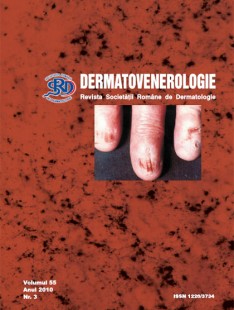Clinical trials and experimental
Treatment with low doses of isotretinoin in moderate acne
Background:
Efficient classical administration of isotretinoin in the treatment of acne consisted in 0.5 to 1.0 mg/kg per day with a duration of treatment between 4 and 8 months reaching a cumulative dose of 120 mg/kg. This regimen causes many side effects that are usually dose dependent.
Objective:
The purpose of this study was to determine the efficacy of low-dose isotretinoin in the treatment of moderate acne.
Methods:
In this prospective, noncomparative study, 102 patients, both male and female, between 15 and 30 years old, with moderate acne were enrolled and treated with isotretinoin at 20-30 mg/day (approximately 0.3 mg/kg per day) for 8 months, the mean total dosage being 72 mg/kg. The clinical and laboratory evaluations were done at the end of the first, 4-th, 6-th and 8-th months of treatment. The follow-up period was one year after the treatment was finished.
In this prospective, noncomparative study, 102 patients, both male and female, between 15 and 30 years old, with moderate acne were enrolled and treated with isotretinoin at 20-30 mg/day (approximately 0.3 mg/kg per day) for 8 months, the mean total dosage being 72 mg/kg. The clinical and laboratory evaluations were done at the end of the first, 4-th, 6-th and 8-th months of treatment. The follow-up period was one year after the treatment was finished.
Results:
At the end of the treatment very good and good results were observed in 97.9% of the patients. Seven patients dropped out of the study because of lack of compliance, one patient stopped the treatment because of worsening depression and another patient discontinued participation because of a severe hyperlipidemia. The most common cutaneo-mucous side effect was cheilitis in 97.9% followed by mild xerosis in 62.1%, reduced night vision in 3.15%, headache in 2.1% and epistaxis in 5.26%. Elevated serum lipid levels (up to 10% higher than the upper limit of normal value) were found in 9.47% of the patients and mild and transient abnormal liver tests were observed in 3.15%. In the 1-year follow-up relapse appeared in one patient.
Conclusion:
Treatment with low-dose isotretinoin of 0,3 mg/kg/day was found to be effective in the treatment of moderate acne, ith a low incidence of severe side effects and at a lower cost than higher doses.


